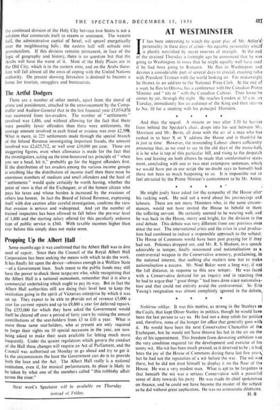AT WESTMINSTER
IT has been interesting to watch the quiet play of Mr. Attlee'f; personality in these days of crisis—his equable personality whic is plainly nourished by secret reserves of strength. At the end of the strained Thursday a fortnight ago he announced that he was going to Washington in tones that he might equally well have used if he had been going to Runcorn. He flies to Washington and devotes a considerable part of several days to crucial, exacting talks with President Truman with the world looking on. For makeweight he throws in an address to the National Press Club. At the end of a week he flies to Ottawa, has a conference with the Canadian Prime Minister and "sits in" with the Canadian Cabinet. Then home he comes by air, through. the night He reaches London at 10 a.m. OR Tuesday, immediately has an audience of the King and then returni
to No. 10 for a meeting with his principal Ministers. .
And then the sequel. A minute or two after 3.30 he hurries from behind the Speaker's chair, drops into his seat between Mr. Morrison and Mr. Bevin, all done with the air of a man who has rushed in to hear X or Y address the House and is thankful he is just in time. However, the resounding Labour cheers sufficiently announce that, as we used to say in the old days of the music-hall, it is he who is top of this particular bill, and rising to the despatch box and leaning on both elbows he reads that uninformative state4 ment, concluding with one or two neat extempore sentences, which we would have put in our script (he no doubt says to himself) had there not been so much happening to us. It is impossible not to feel attracted by the Prime Minister's contentment to be Mr. Attlee.
* He might justly have asked for the sympathy of the House after his racking week. He said not a word about his journeyings and labours. There are not many Ministers who, in the same circum- stances, would not have invited the House to behold in them the suffering servant. He certainly seemed to be wearing well, and he was back in the House, merry and bright, for the division in the coal debate. This debate was very different from any previous ones since the war. The international crisis and the crisis in coal produc., tion had combined to induce a responsible approach to the subject. The House of Commons would have been past praying for if they had not. Polemics dropped out, and Mr. R. S. Hudson, in a speech admirable in temper, finally renounced coal nationalisation as a controversial weapon in the Conservative armoury, proclaiming, ht the national interest, that nothing else matters now but to make nationalisation a success. Mr. Noel Baker went a long way, if not the full distance, in response to this new temper. He was faced with a Conservative demand for an inquiry and in rejecting this he had to argue that "great things" had been done since nationalisa- tion and that could not entirely avoid the controversial. Sir Edo Young's resignation was almost completely ignored in the debate
i Noblesse oblige. It was this motive, as strong in the Stanleys as the Cecils, that kept Oliver Stanley in politics, though he would have been the last person to say so. He had not a deep relish for politics and, therefore, none of the hunger for office that generally goes with it. He would have been the next Conservative Chancellor of the Exchequer, but he would notliave thrown his hat in the air on the day of his appointment. This freedom from devouring ambition was the very condition required for the development and exercise of his sunny wit. His wit has been much praised, as it deserved to be ; it had been the joy of the House of Commons during these last five years but he had not the reputation of a wit before the war. The wit was there, but he did not trust himself to display it on the floor of the House. He was a very modest man. What is apt to be forgotten is that beneath the wit was a serious Conservative with a powerful sense of duty towards his party. He was made its chief spokesmaa on finance, and he could not have become the master of the subject as he did without great application. He was no aristocratic dilettante.
H. B






































 Previous page
Previous page